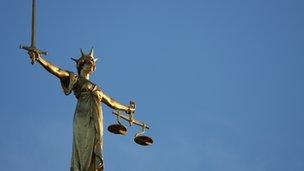Government secret courts plans defeated in Lords
- Published

Critics say it should be judges not ministers who have the final say on what can be heard in public
The government has been defeated three times in the House of Lords over plans to allow ministers to order secret court hearings to consider evidence in cases relating to national security.
Peers backed calls to give judges the say over the use of "closed material proceedings" by 264 votes to 159.
Critics say closed hearings are unfair to defendants and threaten the principle of open justice.
But ministers say intelligence which risks UK lives must not be disclosed.
The House of Lords is debating the Justice and Security Bill, which would ensure far greater use of so-called closed proceedings to examine sensitive intelligence and protect national security.
The BBC's deputy political editor, James Landale, said ministers had been braced for a number of defeats after a coalition of crossbench peers, led by QC Lord Pannick, joined forces with Labour and Liberal Democrat peers to introduce safeguards into the bill.
Peers backed Lord Pannick's call to give judges greater discretion to hold secret hearings, rather than obliging them to do so in national security cases, by a majority of 105.
Once again defying the government, peers voted by 273 to 173 to give judges and defendants, not just ministers, the right to demand closed material proceedings.
After suffering a third substantial defeat on a related issue, ministers chose not to oppose a series of further amendments tabled by opponents.
As such, peers nodded through without a vote changes that would ensure that closed proceedings would be used only as a last resort, and only if the court also had considered using an existing mechanism allowing some proceedings to be secret, known as the public interest immunity system.
However, a backbench Labour and Lib Dem amendment that would have removed the whole concept of secret hearings from the bill was defeated by 164 votes to 25, a government majority of 139, although Labour suggested many of its peers had abstained from voting because it would have contradicted earlier concessions.
'Inherently damaging'
During Wednesday's debate, Lord Pannick said the government's proposals were a "radical departure from the principles of common law and transparent justice".
"We should be very careful in that a closed material proceeding is inherently damaging to the integrity of the judicial process.
"Judicial decisions are respected precisely because all the evidence is heard in open court subject to acceptance and judges give a reasoned judgement which explains their decision."
Speaking in support of the Pannick amendments, Labour's justice spokesman Lord Beecham said they placed judges "firmly in control of the process" while still protecting from disclosure what was essential not to be made public.
But former director of M15, Baroness Manningham-Buller, said closed sessions would enable British spies to defend themselves against "deeply distressing" allegations of torture.
"One of the things that these closed material procedures do is that they give the opportunity for this material, which may or may not reflect badly on the security and intelligence services, to be looked at," she said.
"We are in a position at the moment that we have been judged by many to have been engaged in criminal activities but there have been no prosecutions.
"I do believe closed material procedures are a way that the judiciary can make a judgement on the validity of these claims and give a ruling and give judgement. I really do think we need that for a range of reasons."
Compensation issue
The government says it is currently impossible for it to defend itself against cases of alleged complicity in torture in open court as the disclosure of sensitive information could endanger British agents and compromise relationships with key allies.
Ministers have dismissed suggested safeguards - such as allowing witnesses to give evidence behind screens and redacting names from documents - as inadequate.
They say the UK cannot continue to settle multi-million pound cases against the security services - such as those involving former detainees of Guantanamo Bay - without their allegations being tested in court.
Government spokesman Lord Wallace of Tankerness said there were currently 20 civil damages cases where material "relating to national security would be central" and it was in the interest of all concerned for them to go to court.
"If there is a valid claim being put forward by a claimant, the claimant may not actually be able to have that claim properly vindicated but the case has to settle, but material was necessarily excluded from the court," he said.
- Published21 November 2012
- Published6 March 2012
- Published18 November 2012
- Published25 September 2012